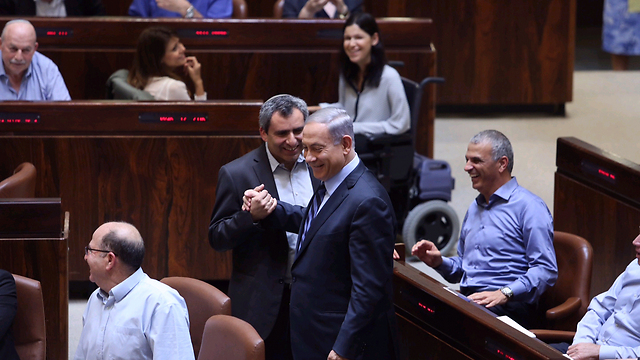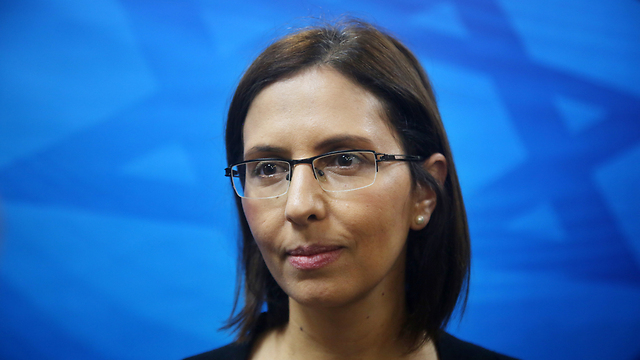
NIS 15 billion for Arab sector - on condition of good behavior
Op-ed: The new five-year plan for the development of Arab communities would not have passed in the government had it been put to a vote two days after the Dizengoff terror attack rather than two days before. But since it has passed, Netanyahu appointed two babysitters for the plan in the form of Ministers Elkin and Levin, to make sure that only Arab communities who deserve the funding get it.
One thing can be said with certainty: If the government plan to invest NIS 15 billion in the Arab sector was put to a vote two days after the Dizengoff terror attack and not two days before it, it would not have passed. Definitely not at such a time.

The man who made the speech of hate and distrust against the Arab public the day after the attack could not have possibly approved this five-year plan. Netanyahu is always the last to recognize the hidden advantages of such plans for his government's image both in Israel and worldwide, and the terror attack once again got the "Bibi" out of him. The one who inflames, terrifies and riles up conflicts. The Bibi who whispers words of hate against the left wing in the ear of Rabbi Kaduri. The Bibi who runs to scenes of terror attacks in order to fan the flames.
And so, only two days after the revolutionary plan - which the Finance Ministry's Budget Department and Social Equality Minister Gila Gamliel worked so hard on - was approved by the government, and then one murderer came out of the Arab sector - Netanyahu tore down the house he worked so hard and so long to build and gave another one of his "those who give will receive" kind of speeches. This time it wasn't against the Palestinian Authority, but against the citizens of his own country - Israeli Arabs.
When I told Ze'ev Elkin that I doubt the plan would've passed in the government had they discussed it after the terror attack, he surprised me. "You might be right," he said candidly.

Elkin and Yariv Levin are the two ministers who were chosen this week, in addition to two professional teams, to submit within a month recommendations on the five-year plan, also called "The Government Action for Economic Development Among Minority Populations" – a title Minister Levin insisted on. The decision was originally meant to benefit the Arab sector. Levin introduced an amendment to change the title of the plan from aiding the Arab sector to aiding minorities. The decision details these minorities as Christians, Muslims, Bedouins, Druze and Circassians.
"It's important," Levin explained, "because one of the biggest arguments was over the Joint Arab List’s attempt to put the entire group of minorities under the heading of 'Arab,' so the minorities would seem like a united, oppositional force against the state."
"My approach," he added, "is that these are separate groups with separate needs. So we broke this thing into parts. I made sure to change the title from Arabs to minorities."
I asked Levin what he thought of Netanyahu's speech at the scene of the terror attack. "An excellent speech," Levin exaggerated. "A speech that presented the equation we strive for: One hand is outstretched to help bring the Arab population to a better place of cooperation, while the other hand wages an all-out war against those who seek to harm us, those who support terrorism."
"The prime minister also gave that same speech in discussions in the government: Those who give will receive,” Levin continued. “Why give money if they're not heading in a direction that is good and important for the state? From the very beginning he was in favor of giving money, but to also know and demand something in return for it."
"The government's five-year plan," according to Levin, "puts Israeli Arabs at a complicated crossroads where they need to make a decision on where they stand. If they are only interested in supporting terrorism - that we don't need to fund."
Elkin and Levin are supposed to gather information, propositions and requests from different relevant bodies and bring their conclusions and recommendations to the government within 30 days. "Our objection," he said, "is not to delay things, and to approve this supplementary package as soon as possible."
It's doubtful the social equality minister, who was off sick with the flu last week, loved Netanyahu's decision to add to the professional teams two babysitters in the form of Elkin and Levin. She worked on the plan for seven months. She met with heads of Arab local councils, MKs from all parties, the finance minister, Treasury representatives, and representatives from the Authority for Social Development. For her, the plan is no less than something that would completely change how things work, and help take Arab society dozens of years forward.
The discussions in the government and in the Likud ministers’ forum about the plan were heated. There is no point in detailing who was in favor of the plan and who was looking for landmines. At the government meeting on the Sunday before the attack during discussions on whether the plan would include mixed cities, Gamliel slammed Miri Regev, saying the culture minister is only worried about mixed cities because of phone calls she's getting from Likud center members, among them mayors of such cities.
"You're a populist," Regev responded. "I'll let you light the populists' torch on Independence Day."

Forced experiment
But Gamliel wasn't the only one to push the plan. The head of the Budget Department in the Finance Ministry, Amir Levy, has been pushing the plan since Yair Lapid was still the finance minister, because he considers it an economic national interest. And in any case, a new plan was needed. The previous plan was passed back when Avishay Braverman was the minister of minorities (2009-2011). The new five-year plan, it's important to note, does not call for any additional funds added to the budget. Most of the money comes from changes in the allocation of funds to the different ministries. Meaning, the ministers are the ones paying for the plan with their ministries' budgets.
The five-year plan was raised for discussion in four government meetings. The first one was at a meeting of the Likud ministers’ forum about two weeks ago. Another discussion was held among all government ministers that same day, and because no decision was reached, the government convened two days before the terror attack in Tel Aviv for two special meetings - one in the morning and one in the evening. Only then did the "decision makers' proposal" (a proposal passed in the government only, bypassing the Knesset -ed) pass and it was decided to form two professional teams whose job will be to look into the issues of construction and civil service. This was following a reservation made by the prime minister on the issue of construction. The "decision makers' proposal" determines that the plan would seek to encourage Multi Residential Buildings - high rise buildings. Netanyahu doesn't want to encourage that. He wants to make it a condition - those who don't build high won't get money.
On the issue of the civil service, the "decision makers' proposal" sought to increase the number of volunteers by 2,000 and change the name to "community service," in order to encourage people to join. There were some ministers who demanded to make the right of communities to receive funds conditional on the number of community service volunteers it has. That's where Deri decided to put his foot down. After all, he has experience with this kind of coercion. It's not wise to force it on them, he said.
On Sunday, two days after the terror attack on Dizengoff Street, the matter went back to the Likud ministers' forum. That was the meeting Elkin and Levin's appointment was decided on. Why? Because the prime minister was concerned the professional teams' recommendations would be minor, while he wanted to change things from top to bottom. And who else but Elkin and Levin could guarantee the kind of changes Netanyahu wants?
I asked Levin why he thought Netanyahu tasked him and Elkin with this.
"It's not the first task he has given us," he answered. "I don't think it's because of our views. After all, there were ministers who did not want the plan from the beginning. He could've given this task to Miri Regev, who I don't think is any more in favor of this plan than us, or to Akunis, who had the most categorical demand for changes."
Levin sees the task he's been given as a great mission. "Take, for example, the clause that takes into account encouragements to communities that have a high percentage of military or civil service," he said. "Elkin and I have an important job, to examine what would be the criteria according to which it will be determined: If there is a school where teachers incite against the draft, or where they don't let representatives from the National Civil Service Forum present the program, or if there's a local council head who refuses to take in people who need to do their civil service in his community - it is inconceivable that this local council enjoys the money from this plan. In places where it will be done well and there is openness, it makes sense that we'd need to encourage and strengthen them. We mustn't have this solely be about giving out money and perpetuating these phenomena, we need to change things."
Last week, these issues went up for discussion in the government once again - this time in the wake of the terror attack in Tel Aviv. Complaints were made about the heavy involvement the Joint List has had in the plan. Those who attended that discussion say it was this grievance that led Netanyahu to appoint Elkin and Levin.










